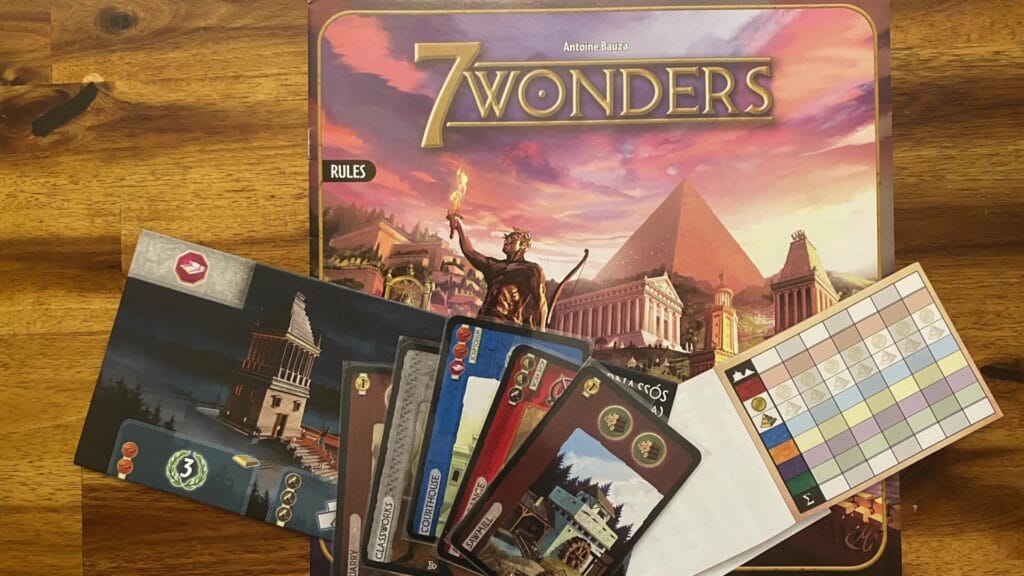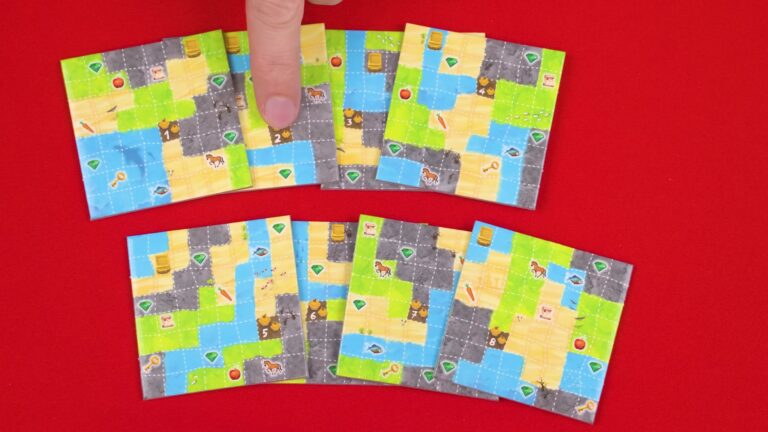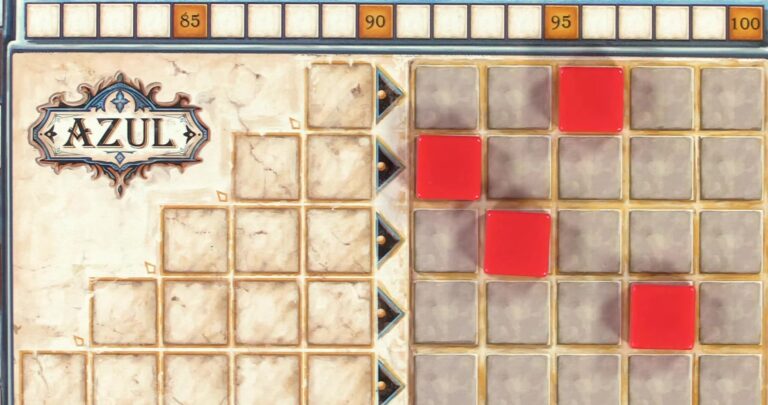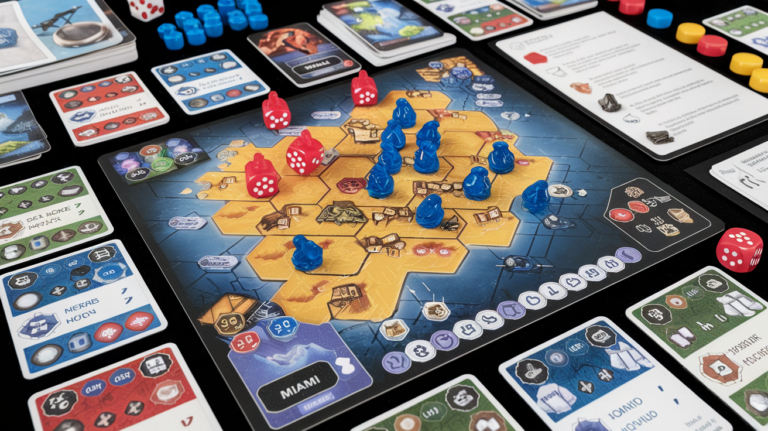Mastering 7 Wonders: The Ultimate Beginner’s Guide and Advanced Strategies

Are you new to 7 Wonders and eager to play like a pro? This guide covers everything from the basics to advanced strategies, giving you the tools you need to excel in 7 Wonders. Whether you're just starting or already have some experience, this guide will help you take your gameplay to the next level.
Introduction to 7 Wonders
7 Wonders is a strategic board game that combines resource management, card drafting, and tactical decision-making. Its engaging gameplay and replayability make it popular with both casual players and seasoned strategists. Let’s explore the components and gameplay to ensure you’re ready to play confidently.
Getting Started with 7 Wonders
Key Components of 7 Wonders
Before diving into the game, familiarize yourself with the key components:
- Wonder Boards: Each player has a board representing a historical wonder, each with unique abilities.
- Cards: The game features six types of cards—Resource, Commercial, Military, Scientific, Guild, and Wonder cards.
- Tokens: Conflict and Victory tokens track player progress throughout the game.
- Coins: Coins are used for trading and building structures.
Setting Up the Game
- Select your Wonder board (choose between sides A and B for different abilities).
- Shuffle and distribute the cards based on the number of players.
- Place the coins and tokens where all players can access them.
- Review the rules to ensure everyone is on the same page.
Pro Tip: Keep a quick-reference sheet for card types and gameplay phases to help simplify learning.
Gameplay Basics of 7 Wonders
Phases of the Game
7 Wonders is played over three distinct ages:
- Age I: Focus on building basic resources and structures.
- Age II: Expand your strategy by playing advanced cards.
- Age III: Shift your focus to endgame scoring, including Guild cards.
Each age offers unique opportunities and challenges, making your choices crucial for success.
Turn Structure
Each player’s turn follows this sequence:
- Choose a card from your hand.
- Decide to either build it, discard it for coins, or use it to advance your Wonder.
- Pass the remaining cards to the next player.
Resource Tip: Trading resources with your neighbors can be a game-changer. But keep an eye on their progress, as it may influence your decisions.
Building Your Wonder
Wonder Boards and Their Role
Wonder boards provide unique benefits and bonuses. It’s important to decide when to invest resources in building your Wonder, as unlocking stages early can provide a significant advantage.
Effective Strategies for Building Wonders
- Early Investment: Build stages early to unlock valuable bonuses.
- Balanced Approach: Don’t just focus on your Wonder. Ensure you’re also scoring in other areas, such as Military or Science.
Timing is critical. While Wonder-building is important, over-prioritizing it can leave you vulnerable in other areas.
Military Conflicts in 7 Wonders
Military Cards Explained
Military cards, marked with shields, are key for resolving conflicts. At the end of each age, players compare their shield count with their neighbors to determine the outcome.
Resolving Conflicts
- Victory: Win Victory tokens based on the age (1 point in Age I, 3 in Age II, 5 in Age III).
- Defeat: Lose a Conflict token, which results in a -1 penalty.
Focus on military cards if your neighbors are aggressively building armies. A strong defense helps protect your score.
Scientific Progress in 7 Wonders
Science Cards and Their Power
Science cards come with three symbols: gears, compasses, and tablets. The scoring system revolves around:
- Sets of three different symbols.
- Multiple cards with the same symbol for higher points.
Maximizing Scientific Points
Investing in Science early gives you a powerful long-term advantage. This strategy can snowball and deliver significant points by the endgame, especially if you collect cards throughout the ages.
Commercial Structures in 7 Wonders
Commercial Cards Explained
Commercial (yellow) cards improve resource access and trading options, making them crucial for:
- Reducing construction costs.
- Providing coins or resources.
Optimizing Resource Management
Plan your resource purchases carefully. Trading can often be more efficient than overbuilding your resource production base.
Guilds and Endgame Strategy
Understanding Guild Cards
Guild cards appear only in Age III and offer substantial scoring opportunities. Some examples include:
- Points for military cards.
- Points for Wonders that have been completed.
Using Guilds Effectively
Play Guild cards that align with your strengths. For instance, if you’ve been focused on Science, choose Science-related Guilds to maximize points.
Advanced Strategies for 7 Wonders
Mastering Military Strategy
Focus on dominating military early to secure Victory tokens and deter opponents from challenging you. A strong military defense is often underestimated but can prevent your neighbors from gaining an advantage.
Scientific Synergy
Maximizing Science cards can lead to massive endgame points. Aim to collect multiple symbols early in the game, as each symbol significantly boosts your scoring potential. Combining cards for both set bonuses and multiples can make you a formidable contender by Age III.
Commercial Dominance
Focus on Commercial cards to control resources and coins. This strategy gives you flexibility, especially when you need to build structures without relying too heavily on resource production. Combining this with a strong Wonder can offer numerous points while maintaining a balanced economy.
Adapting to the Number of Players
- 3-4 Players: There’s more direct interaction, so you can monitor opponents more closely and adjust your strategies accordingly.
- 5-7 Players: With more players, it becomes more difficult to keep track of everyone’s strategy, so focus on managing resources effectively while also keeping an eye on your neighbors’ progress.
Expansions and Variants
Overview of Popular Expansions
Explore new dimensions of the game with expansions like:
- Leaders: Adds unique abilities for each leader.
- Cities: Introduces diplomacy and debt mechanisms.
- Armada: Brings naval warfare into the mix.
How to Integrate Expansions
Start with one expansion at a time to master its mechanics. Each expansion brings a new strategic layer, so take the time to understand the nuances before adding more complexity.
Tips and Tricks for 7 Wonders
Common Mistakes to Avoid
- Over-committing to one strategy without flexibility.
- Neglecting resource management, which can leave you stranded without options.
- Ignoring your neighbors’ actions, which can put you at a disadvantage.
Pro Tips for Mastering 7 Wonders
- Stay adaptable: Be ready to shift strategies based on your card draws and opponents’ moves.
- Diversify your approaches for balanced scoring across categories.
- Keep an eye on your opponents’ strengths and find ways to counter their strategies.
Conclusion
7 Wonders is a dynamic game of strategy, resource management, and adaptability. By mastering both the basic and advanced strategies, you’ll improve your gameplay and enjoy endless fun with this classic game. Experiment with different strategies and expansions to find the playstyle that suits you best.
Happy gaming!






